Gov. Kay Ivey announces special election dates for Senate District 9

On Wednesday, Governor Kay Ivey signed a proclamation setting special election dates for Alabama Senate District 9. This seat was previously held for the last 13 years by Sen Clay Scofield (R-Guntersville), who resigned Monday to take a position as the Vice President of the powerful Business Council of Alabama (BCA). Governor Ivey set the special primary election for Tuesday, January 9, 2024, and the special primary runoff, if necessary, for Tuesday, February 6, 2024. The special general election is set for Tuesday, April 23, 2024. “Majority Leader Scofield has been a strong voice for the people of Senate District 9 for more than 13 years, and I have no doubt that he will continue to serve our state well in his next chapter,” said Gov. Ivey. “Clay and I have worked together both while I served as lieutenant governor and now as governor. Certainly, I can attest for all he has done for the people in North Alabama and Alabamians all across our state. I encourage everyone in this district to get out and vote during this special election and send another strong voice to Montgomery.” Gov. Ivey set a very short qualifying period of just seven days for this special election. The deadline for qualifying with major political parties will be Tuesday, November 7, 2023, at 5:00 p.m. The deadline for all independent candidates and minor parties to submit their paperwork, including ballot access petitions, is Tuesday, January 9, 2024, at 5:00 p.m. Senate District 9 represents portions of Blount, Madison, and Marshall Counties. State Representative Brock Colvin (R-Guntersville) has already announced his intention to run for this position, as has State Representative Wes Kitchens (R-Boaz). At least three other candidates are reportedly strongly considering running for this open state Senate seat. On Monday, the GOP state senators elected Steve Livingston (R-Scottsboro) to replace Scofield as Senate Majority Leader. The Alabama Senate pays $53,913 a year and is a part-time position. To connect with the author of this story or to comment, email brandonmreporter@gmail.com.
Kay Ivey says ‘steady progress’ being made on Dolly Parton’s Imagination Library program

On Tuesday, Alabama Governor Kay Ivey provided an update on the statewide expansion of Dolly Parton’s Imagination Library (DPIL). The Governor announced that the program that provides books to children continues to grow steadily. Since Governor Ivey kicked off the statewide expansion in August, the program has grown to serve more than 49,000 children. “I am excited to see the rapid growth and response from communities across the state that are now serving children and families by providing Dolly Parton’s Imagination Library in Alabama,” said Gov. Ivey. “The enrollment numbers are encouraging, but our work isn’t done. We still have thirteen counties where the program is not available, and it is my goal for all children age five and younger in our state to be provided coverage.” Ivey said that her number one priority is ensuring that every child is a successful reader by the 3rd grade. Ivey believes that by providing opportunities for every child in our state to interact with books, we prepare infants and young children across Alabama for future success. Dolly Parton’s Imagination Library allows parents and families to open a book and read to their children, laying that critical foundation. “Dolly Parton’s Imagination Library is a grassroots, community-based program,” said Gov. Ivey. “Our goal of serving nearly 200,000 children is within reach, and bringing these final counties on board will require strong partnerships and support on the local level. We can’t miss this opportunity to inspire a love for reading and learning in our next generation of Alabamians.” Kahla Williams is the Dollywood Foundation Regional Director. “We have seen not only steady enrollment growth (almost 10,000 more children enrolled in Alabama since August) but a rapid growth of awareness and interest from local organizations across the state looking to get involved,” said Director Williams. “We thank all the local communities and partners who have stepped forward to help pursue DPIL’s mission, and Governor Ivey for the personal approach her administration has taken to grow the program across the state.” Dolly Parton’s Imagination Library was created to inspire a love of reading by gifting free books each month to children from birth to age five. The program works with local partners to help fund and sustain the program. The state’s investment in the Imagination Library allows local partners to quickly launch book deliveries to as many children as possible across the state. The books delivered monthly are free to all children and families who sign up for the program. Jan Hume is the acting Secretary of the Alabama Department of Early Childhood Education. “We are continuing to collaborate with communities across the state to provide full coverage in the partially covered counties and to find local community partners in counties where the program is not available,” said Secretary Hume. “To help bring these final counties on board, funding has been made available to cover the local cost for the first two years of the program that will allow the opportunity for the local community partner to fundraise and kickstart enrollment.” New Senate Majority Leader Steve Livingston (R-Scottsboro) said, “Several years ago, one of my constituents, Debbie Barclay, approached me asking for the resources necessary to start the Dolly Parton Imagination Library. When Governor Ivey announced she was introducing the Imagination Library statewide, all of Jackson County, especially Debbie, was excited. For our students to have a lifetime of success, we must put books in their hands during their formative years, and Governor Ivey understands that. I thank her for her continued leadership to champion programs that will make a difference for our children.” Ivey declared her intent to participate in Dolly Parton’s Imagination Library during her 2023 Inaugural Address and followed through on her promise with Executive Order 729. Governor Ivey continues to encourage parents to register their children and take advantage of Dolly Parton’s Imagination Library in Alabama. To learn more about becoming a community partner, contact Kahla Williams at kwilliams@imaginationlibrary.com. Parents can enroll their children in this program and learn more as it is expanded across the state by visiting the Dolly Parton Imagination Library website. Since launching in 1995, Dolly Parton’s Imagination Library has become the preeminent early childhood book-gifting program in the world. The flagship program of The Dollywood Foundation, a 501(c)(3) non-profit organization, has gifted over 200 million free books in the United States, Canada, the United Kingdom, Australia, and The Republic of Ireland. Research results suggest that there are positive increases in key early childhood literacy metrics from participation in the program. To connect with the author of this story or to comment, email brandonmreporter@gmail.com.
Steve Livingston elected new Senate Majority Leader, replacing Clay Scofield
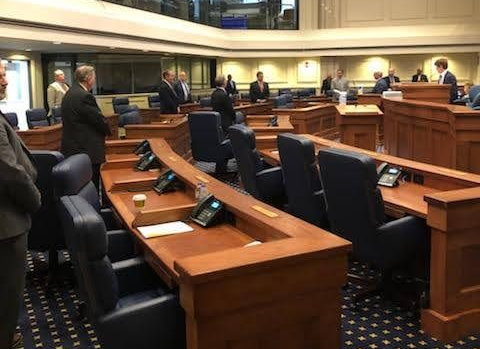
On Monday, Senate President Pro Tempore Greg Reed (R-Jasper) announced that State Senator Steve Livingston (R-Scottsboro) had been elected the new Senate Majority Leader, replacing Sen. Clay Scofield (R-Guntersville), in a meeting of the Republican state senators. “The process of electing Senator Livingston was efficient and effective,” Reed said. “The Republican Caucus emerged with a united decision, and we look forward to continuing to lead Alabama toward guaranteeing the state is a better place to live, work, and raise a family. I am excited about the transformative work we are doing and the goals we will achieve throughout our third quadrennium of leadership.” Speaker of the House Nathaniel Ledbetter (R-Rainsville) congratulated Livingston on his election. “In addition to being one of my closest friends for many years, Steve Livingston has been a mentor of mine since the first moment I joined the House and a strong leader whose example I respect deeply,” said Ledbetter. “Sen. Livingston is a man of strong convictions and conservative beliefs, and he will lead his colleagues with the fairness, strength, and common sense that are his trademarks.” As was reported by Alabama Today, Sen. Scofield resigned from the Senate on Monday. “I have resigned from the Senate to become the Executive Vice President of the Business Council of Alabama,” Scofield wrote in a letter. This decision was one of the hardest that I have ever had to make, and with any decision of this magnitude, I involved a lot of prayer and talked it over with family and friends. If I didn’t love serving you, the decision would have been easy. It’s a dream job with an organization whose mission I strongly believe in. I have always supported policies that make Alabama more business-friendly because if we have healthy businesses, they can create more high-paying jobs. As President Ronald Reagan said: “I believe the best social program is a job.” This new job will allow me to continue my mission to make Alabama the most business/job-friendly state in the nation. “I also want to thank Senator Scofield for his unwavering dedication to the state of Alabama during his term as Majority Leader and tenure in the Alabama Senate,” Reed said. “After entering the Senate together nearly 14 years ago, Senator Scofield has proven himself to be an enduring friend, an exceptional leader, and a true champion for the people of Alabama. We wish Senator Scofield well in his future endeavors.” The Majority Leader is the second most powerful member of the Senate, behind the President Pro Tem. Next would be the Senate Rules Committee Chairman – Sen. Jabo Waggoner (R-Vestavia). Livingston represents Jackson, Dekalb, and Madison counties in the Alabama Senate, To connect with the author of this story or to comment, email brandonmreporter@gmail.com.
CFD Research launches growth project at Test Center in Jackson County, Alabama
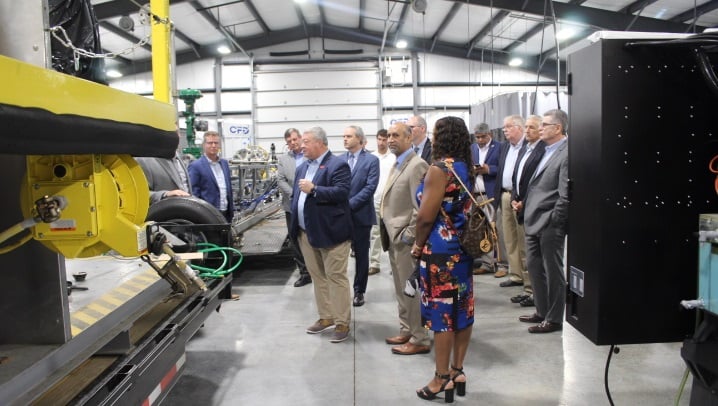
CFD Research Corp. has formally kicked off a construction project to add a new facility at its Engineering Test Center in Jackson County that will allow it to expand activities at its growing site located in Hollywood. Huntsville-based CFD Research said the new 19,000-square-foot building will support work for ongoing contracts with the Army Space and Missile Defense Command, the Air Force Arnold Engineering Development Complex, and other customers. The building will provide more than 28 additional offices, a second-high bay, a larger conference room space, and closed areas for classified meetings. The facility will expand the team’s capability to provide services, perform technology development, and enable increased test capacity. “CFD Research specializes in delivering next-level technologies, services, and products that keep us all safe, and this expansion project at its Hollywood site will help the company achieve new milestones in that critical mission,” said Greg Canfield, secretary of the Alabama Department of Commerce. Alabama Commerce Secretary Greg Canfield speaks to CFD Research Chief Executive Sameer Singhal at an event to kick off a project to add a new facility at the company’s Engineering Test Center in Jackson County. (CFD Research) Joining Canfield at a groundbreaking were U.S. Rep. Dale Strong, state Sen. Steve Livingston, Scottsboro Mayor Jim McCamy, and Nathan Lee, president of the Jackson County Economic Development Authority. “Thank you to the town of Hollywood and Jackson County for welcoming us so graciously and celebrating this groundbreaking event, and thank you to the Alabama Department of Commerce for its support,” said Sameer Singhal, president and CEO of CFD Research. “The location and proximity to our other facilities have been an ideal solution and will enable us to work more efficiently and economically.” In August 2021, CFD Research opened its 13,125-square-foot test and evaluation facility on 10.4 acres in Jackson County Industrial Park in Hollywood. In November 2022, CFD Research added 63 acres and an additional test stand four times larger than the company’s previous capability to expand its manufacturing, system integration, and test and evaluation services. CFD Research had four employees at the Testing Center when it opened. It now has 22 employees there and expects to surpass 40 employees in the near future. This story originally appeared on the Alabama Department of Commerce’s Made in Alabama website. Republished with the permission of The Alabama NewsCenter.
Federal court rejects Alabama’s request for a pause on congressional map ruling
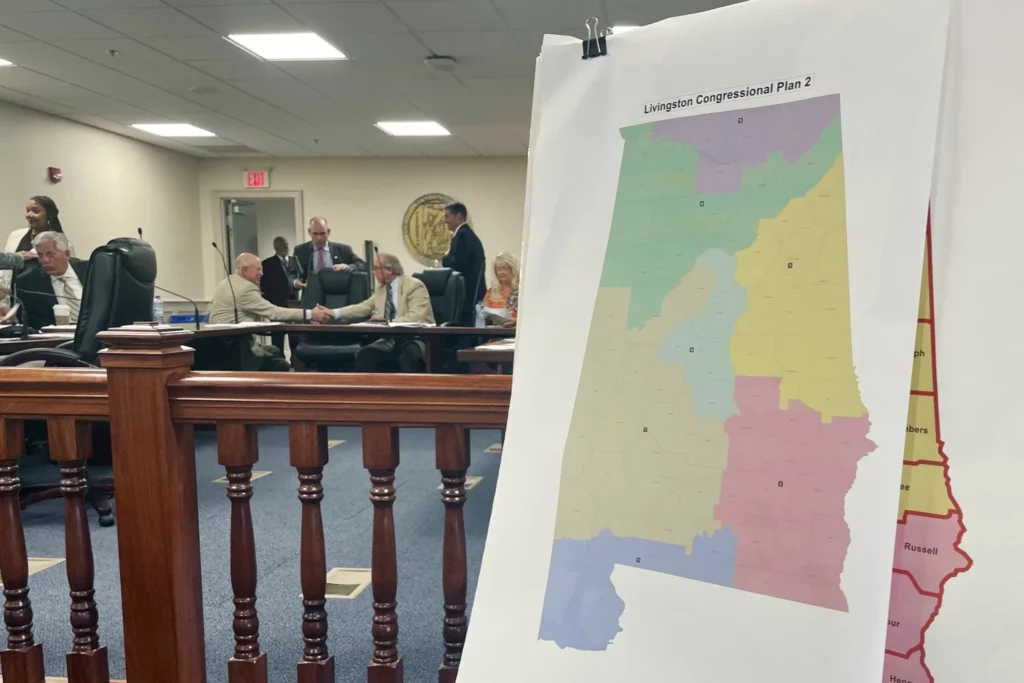
On Monday, the State of Alabama suffered another major setback in its ongoing congressional redistricting map saga when the federal three-judge panel that is hearing Alabama’s congressional redistricting case denied the state’s request that the ruling be paused to give the state time to appeal to the U.S. Supreme Court – again. The federal three-judge panel wrote in their ruling on Monday, “It is exceptionally unusual for a litigant who has presented his arguments to the Supreme Court once already — and lost — to assert that he is now ‘overwhelmingly likely’ to prevail on those same arguments in that Court in this case.” The three-judge panel ruled that the state likely violated the Voting Rights Act of 1965 when it passed a congressional redistricting plan in 2021 that created six majority-white and just one majority-Black Congressional District. The court ordered the state to suspend the 2022 congressional elections and submit a compliant map. The state refused and instead appealed to the Supreme Court. The high court upheld the three-judge panel’s order allowing the 2022 election to proceed with the 2021 maps. In June, the Supreme Court ruled in Allen v. Milligan that the three-judge panel was right in their 2022 preliminary ruling and remanded the case back to them in a controversial 5 to 4 ruling against the state of Alabama. After the state’s rebuke by the Supreme Court, the three-judge panel ordered the state to prepare a map with two majority-minority districts “or something close to it.” The Alabama State Legislature met in a July special session. Instead of complying with the court order, the Republican-dominated Legislature passed a new map that increased the Second Congressional District from 30% Black voting age population to 39.9%. The Republicans in the Senate claimed that their ‘Livingston 3’ map kept communities of interest together and was as compact as possible. They argued that this was as close to fulfilling the court’s order. Never mind that the Republican-dominated House of Representatives had passed a map by Representative Chris Pringle (R-Mobile) with a 43.3% Black 2nd District. When the Pringle plan arrived in the Senate, State Senator Steve Livingston (R-Scottsboro) simply substituted it for his Livingston 3 map. The state adopted the Livingston 3 map. Livingston and Pringle are the joint co-chairs of the Legislature’s Joint Committee on Reapportionment. The Legislature’s Democrats and the civil rights groups suing the state asked the three-judge panel to reject the partisan Livingston 3 map. The three-judge panel complied, ruling that it (like the 2021 redistricting map) violated the Voting Rights Act. The court has appointed a special master to draw Alabama’s new congressional districts map. Alabama Secretary of State Wes Allen (R), on the advice of Attorney General Steve Marshall (R), appealed that ruling to the U.S. Supreme Court. Monday’s setback by the three-judge panel means that the court-appointed special master will continue redrawing the state’s seven congressional districts to create that second majority Black District. That map, which nobody has seen yet, will likely be the map the state will use to vote next year. The special master is supposed to be finished with his new map by September 25. The state is still asking the Supreme Court to intervene, but there is no guarantee that the Court will even hear this case. If it does agree to listen to the case, it is unknown if the Justices will allow the 2024 election to proceed with the Legislature’s Livingston 3 map or if they will allow the election to proceed with the new special master map. Democrats hope to use the Allen v. Milligan ruling to force states to create new majority-minority districts. The major party primaries are on March 5. The Alabama Democratic Party told Alabama Today Monday that candidate qualifying for Democrats will open on September 29. The Alabama Republican Party announced during the day that GOP candidate qualifying will not begin until October 16. Both parties are closing qualifying on November 10. To connect with the author of this story or to comment, email brandonmreporter@gmail.com.
CFD Research expands their facility in Hollywood, Alabama

Last week, CFD Research Corporation held a groundbreaking ceremony for an additional facility at its Engineering Test Center in Hollywood, Alabama. The company said that the new 19,000-square-foot building will support work for ongoing contracts with the Army Space and Missile Defense Command (SMDC), the Air Force Arnold Engineering Development Complex (AEDC), and other customers. Sameer Singhal is the President and CEO of CFD Research. “Thank you to the town of Hollywood and Jackson County for welcoming us so graciously and celebrating this groundbreaking event, and thank you to the Alabama Department of Commerce for its support,” said President Singhal. The location and proximity to our other facilities has been an ideal solution and will enable us to work more efficiently and economically.” Economic developer Dr. Nicole Jones told Alabama Today, “CFD Research has grown exponentially in two years.” “The company offers highly-skilled career opportunities in manufacturing, system integration, and test and evaluation services,” Jones said. “CFD Research’s 19,000 square foot facility in Jackson County further enhances north Alabama’s role in supporting the Department of Defense and national security.” Greg Canfield is the Secretary of the Alabama Department of Commerce. “CFD Research specializes in delivering next-level technologies, services, and products that keep us all safe, and this expansion project at its Hollywood site will help the company achieve new milestones in that critical mission,” said Secretary Canfield. The building will provide more than 28 additional offices, a second-high bay, larger conference room space, and closed areas for classified meetings. This facility will expand the team’s capability to provide services, perform technology development, and enable increased test capacity. In August 2021, CFD Research opened its 13,125-square-foot test and evaluation facility on 10.4 acres in Jackson County Industrial Park in Hollywood, AL. In November of 2022, CFD Research added another 63 acres of property to the facility and an additional test stand that is four times larger than CFD Research’s previous capability to expand the company’s manufacturing, system integration, and test and evaluation services. CFD Research started with just four employees at the Testing Center when it opened in 2021. It has grown to 22 employees presently. CFB anticipates surpassing over 40 employees in the near future. US Congressman Dale Strong (R-AL05) headlined the ceremony. “It was a pleasure visiting Jackson County this week,” Rep. Strong said. “I started the day celebrating CFD Research’s expansion at the industrial park in Hollywood.” State Senator Steve Livingston, Scottsboro Mayor Jim McCamy, and Nathan Lee, President of the Jackson County Economic Development Authority, were also in attendance. CFD Research Corporation specializes in engineering simulations, advanced prototypes, and innovative designs for aerospace, defense, life sciences, materials, energy, and other industries. CFD Research uses its software and experimental capabilities to develop new hardware concepts, innovative designs, and superior solutions for its customers with lower risk, reduced costs, and less time. CFD Research has grown steadily and profitably every year since its inception in 1987. To connect with the author of this story or to comment, email brandonmreporter@gmail.com.
Legislature passes Republican congressional redistricting plan
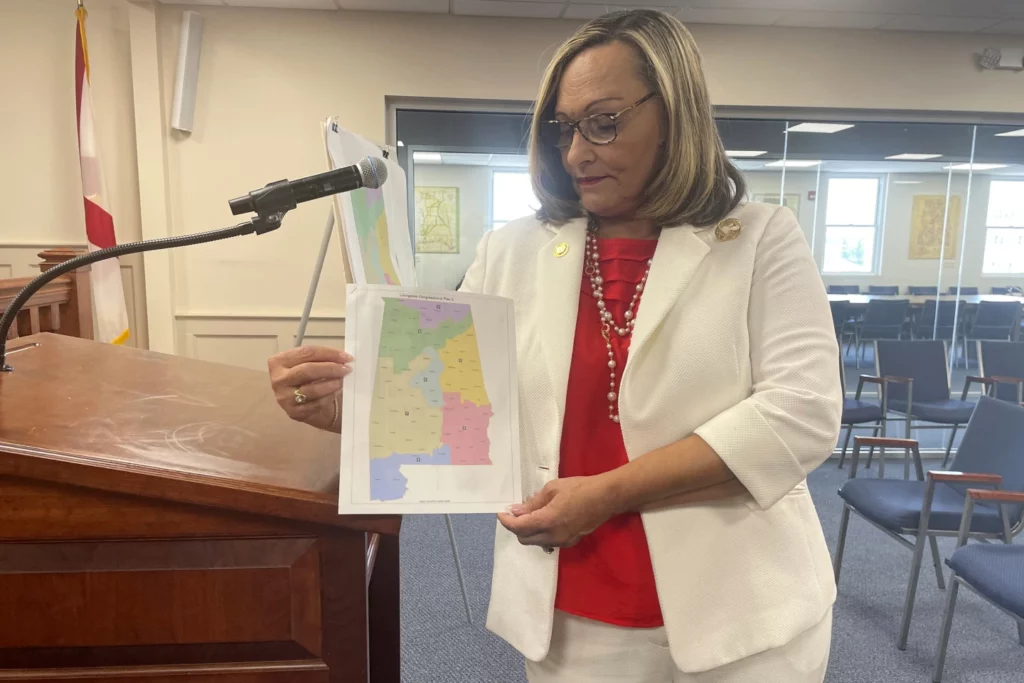
The Alabama Legislature passed a Republican congressional redistricting plan on Friday, setting up a battle in federal court that could either result in a federal court drawing Alabama’s congressional districts map or the most serious court challenge to the controversial Section 2 of the Voting Rights Act of 1965 in decades. In June, the U.S. Supreme Court ruled that the redistricting plan passed by the Legislature in 2021 likely violated the Voting Rights Act of 1965. A three-judge panel in Atlanta ordered the state to draw a map with two majority Black congressional districts “or something close to it.” The Legislature entered Friday with two Republican maps. One map increased Alabama’s Second Congressional District from 30% Black to over 42% Black. That plan was sponsored by State Representative Chris Pringle (D-Mobile). The other plan was sponsored by State Senator Steve Livingston (R-Scottsboro). The Livingston plan only increased the number of Black voters in CD2 from 30% to 38%. The House passed the Pringle plan while the Senate debated the Livingston plan. After the Senate voted to nonconcur with the Pringle plan, six legislators went into a six-member conference committee, and the four Republicans on the committee submitted a third plan. This map had previously been unseen by the press, the public, Democratic legislators, and presumably most Republican legislators. Both Houses of the Legislature then voted to adopt the conference committee plan. The conference committee map leaves the Seventh Congressional District as the state’s only majority Black congressional district. It did increase the percentage of Black voters in CD2 from 30% to 39.9%. CD2 is currently represented by Freedom Caucus Republican Barry Moore (R-Enterprise). Moore staffers were in the Statehouse on Frida meeting with legislators. Plaintiffs in the lawsuit have vowed to reject the Republican plan and adopt one of the Democratic plans that create two majority-minority districts or appoint a special master to draw Alabama’s congressional maps. Alabama Governor Kay Ivey released a statement saluting the Legislature for their hard work and bold stance. “Following the U.S. Supreme Court order, I called the Alabama Legislature into a special session to readdress our congressional map,” said Gov. Ivey. “The Legislature knows our state, our people, and our districts better than the federal courts or activist groups, and I am pleased that they answered the call, remained focused, and produced new districts ahead of the court deadline.” The Alabama House Democratic Caucus (AHDC) was not pleased with the plan that passed without Democratic support. “Once again, the Republican majority in Alabama is putting political ambition ahead of what is right and just,” the AHDC wrote. “And again, unfortunately, partisan politics is coming before Democratic rights, despite a decision upheld by the highest court in the land.” “The court ruled that our Black population is large enough and geographically compact enough to create a second district,” the AHDC continued. “And yet, the majority pushed through a map that blatantly fails to meet that standard.” “The House Democratic Caucus endorsed a map, supported by the plaintiffs, that satisfies that court’s ruling,” the AHDC added. “That majority has repeatedly ignored that option in an attempt to sidestep their duty to draw maps that represent all Alabama voters fairly and equitably.” Congresswoman Terri Sewell (D-AL07) released a statement expressing disappointment with the Legislature’s work. “Today, the State of Alabama has shamelessly chosen to ignore the Supreme Court,” Rep. Sewell said. “The map advanced by the state legislature includes only one majority-minority district and a second district where Black voters make up only 39.9 percent of the voting age population.” “This map does not comply with the Supreme Court’s order and is an insult to Black voters across our state,” Sewell added. “I fully expect that it will be rejected by the courts.” The Legislature has met the July 21 deadline set by the federal court in Atlanta. A hearing on Alabama’s congressional redistricting is scheduled for August. There is wide speculation that whatever happens in Atlanta with this redistricting, the loser will appeal to the U.S. Supreme Court. There is no guarantee that the Supreme Court will accept the case. To connect with the author of this story or to comment, email brandonmreporter@gmail.com
Redistricting plan goes to a conference committee

On Friday, the Alabama House of Representatives passed a Republican congressional redistricting plan that it hopes will comply with the Voting Rights Act of 1965. The Alabama Senate voted 30 to 0 to non-concur with the House plan. The redistricting plan has been referred to a conference committee to produce a compromise version that is acceptable to both Houses of the Legislature. For redistricting to pass out of the Legislature, the six-member conference committee has to reach a compromise. Then both Houses of the Legislature must vote to concur with the findings of the conference committee. Senate Bill 5 is sponsored by State Senator Steve Livingston (R-Scottsboro). The bill was carried in the House of Representatives by State Representative Chris Pringle (R-Mobile). Both Livingston and Pringle have introduced competing versions of the redistricting bill. The version of the bill that passed in the House is the Pringle version, the community of interest plan. Pringle’s plan would redraw Alabama’s Second Congressional District, currently represented by Congressman Barry Moore (R-AL02), to increase the Black voting age population in CD2 from 30% of the population to over 42%. Senate Democrats have introduced multiple plans that would produce two majority-minority districts. Livingston’s competing plan passed out of the Senate on Wednesday. Pringle says that his plan’s CD2 would meet the Supreme Court’s ruling that the state provides an opportunity for Blacks to pick a candidate of their choice. Democrats disagree. “You are giving me an opportunity to lose,” said Senate Minority Leader Bobby Singleton (D-Greensboro). “There ain’t no opportunity there for Blacks or Democrats in that district,” said Sen. Rodger Smitherman (D-Birmingham). Democrats maintain that it is necessary for there to be two majority-minority congressional districts for Black voters to have an opportunity to choose their own representation. They also maintain that that is what the court intended. Sen. Merika Coleman (D-Birmingham) said, “I contend that for African Americans to choose the candidate of their choice that we have to have a majority of African-Americans.” “It is irresponsible for the legislature to do what it is doing,” Coleman said. “The court ordered two districts that have 50% African Americans.” “The three-judge panel said that a proper remedy could consist of two majority-minority districts or quite close to it,” said Rep. Artis “A.J.” McCampbell (D-Livingston). The House of Representatives passed SB5 76 to 26. The Senate, in their own debate on redistricting, then voted 30 to 0 to concur with the House version of SB5 and go to a conference committee. Senate President Pro Tempore Greg Reed (R-Jasper) appointed Sens. Livingston, Smitherman, and Clay Scofield (R-Guntersville) to the conference committee. Speaker of the House Nathaniel Ledbetter (R-Rainsville) appointed Pringle, Chris England (D-Tuscaloosa), and Chris Sells (R-Greenville) to the conference committee. Both Houses of the Legislature will return on Friday afternoon, presumably to vote on the conference committee report. To connect with the author of this story or to comment, email brandonmreporter@gmail.com.
Legislature to finish redistricting today
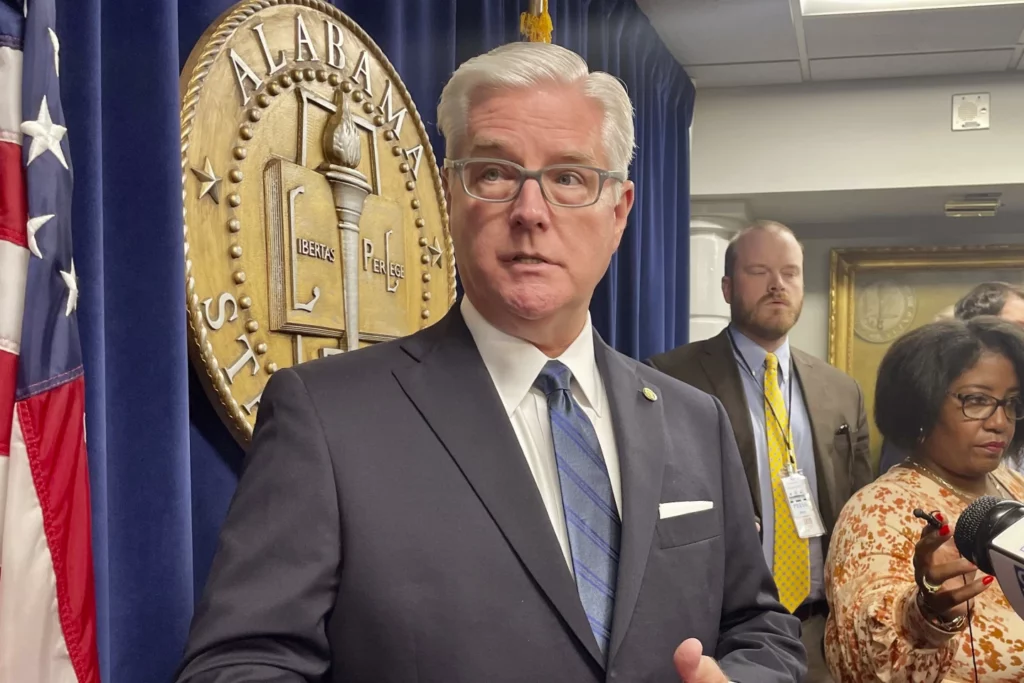
On Friday, both Houses of the Alabama Legislature will meet on redistricting. The federal appeals court in Atlanta has set Friday, July 21, as the deadline for the state to submit a new congressional redistricting for the court to consider in the state’s ongoing Voting Rights Act case concerning congressional redistricting. There are a lot of disagreements in the Legislature on what plan the legislators should pass. Legislative Democrats, the plaintiffs in the lawsuit against the state, and civil rights groups believe that to comply with the Voting Rights Act of 1965, the state should pass a plan with two majority-minority districts. This would almost certainly mean a pickup of one House of Representatives seat for Democrats in the U.S. Congress as Alabamians overwhelmingly vote along racial lines, with over 90% of Black Alabamians preferring Democrats and over 80% of White Alabamians preferring Republicans in recent elections. Alabama’s Legislative Republicans have rejected calls by Democrats to turn Alabama’s Second Congressional District into a majority-minority district. Congressional District 2 is currently represented by Congressman Barry Moore (R-Enterprise) – who served two terms in the Alabama House of Representatives from 2010 to 2018. Moore is a Republican, a member of the conservative Freedom Caucus, and an ardent Donald Trump supporter. Currently, 30% of the voters of CD2 are Black. State Senator Rodger Smitherman (D-Birmingham) has introduced a plan that would turn Congressional District 2 into a majority-minority district with over 50% of the voters in the district being Black. Republicans rejected that map as well as others introduced by Sen. Bobby Singleton (D-Greensboro) and other Democrats. Republicans maintain that the court has not ruled on Milligan v. Allen that the state is in violation of the Voting Rights Act. Democrats look at the same U.S. Supreme Court ruling and the recent order by a three-judge panel of the Eleventh Circuit Court of Appeals and say that the court did not provide the state with enough guidance to know what an “opportunity district” means. “That could be 42% (Black voters), that could be 38%, we just don’t know,” Senate President Pro Tempore Greg Reed (R-Jasper) told reporters. House Republicans have passed a plan by State Representative Chris Pringle (R-Mobile) they title the community of interest plan where Congressional District 2 is over 42% Black. Pringle maintains that that is close enough racially so that it is winnable by either party. Senate Republicans have passed a competing plan by State Sen. Steve Livingston (R-Scottsboro). The Livingston plan would only raise the Black voting age population of CD2 from 30% Black to 38% Black. Livingston said his plan kept communities of interest together and is the most compact while still providing an opportunity district for Black voters in Congressional District 2. More radical elements in the Legislature had called for turning Alabama’s Seventh Congressional District into an opportunity district that would be potentially winnable by Republicans. Congressional District 7 is represented by Terri Sewell – the only Democrat and the only Black representative in the congressional delegation. Both Pringle and Livingston, while deeply divided on the merits of their respective plans, did not go that far, and Congressional District 7 remains majority Black. Livingston said that his plan kept the Wiregrass whole and in the Second Congressional District, and it keeps the Gulf Coast and Mobile County whole. The House passed Pringle’s plan on Wednesday, but when he brought his bill to the Senate, Livingston motioned to substitute the Pringle plan for the Livingston plan. The Committee passed that motion. Pringle then stormed out of the room without continuing to present his bill. His bill, now the Livingston Bill, was passed by the Committee along party lines, with Democrats voting against it and Republicans voting for it. The one exception was State Senator Andrew Jones (D-Centre). His primary disagreement with the Livingston plan is that a small portion of northwest Etowah County would be in Congressional District 4, while 90% of Etowah County would switch to Congressional District 3. Jones told reporters he did not care whether Congressman Mike Rogers (R-AL03) or Robert Aderholt (R-AL04) represented Etowah County. “My issue is that historically Etowah County has not been divided,” Jones, who represents Etowah and Cherokee Counties, said. Smitherman told reporters that he and Sen. Singleton had brought their own federal lawsuit and joined Milligan and the other plaintiffs. Smitherman said that it is his understanding that the plaintiffs will be given the opportunity to tell the court whether the plan passed by the Legislature satisfies their concerns or not. “Right now, I can’t support either (Republican) plan,” Smitherman said. Smitherman has demanded that the Apportionment Committee prepare a report on the plans showing the likelihood of a Democrat or a Republican winning each of these. “They can get that, or they already know it and don’t want to release it,” Smitherman said, Since the GOP is wildly divided on which plan they will advance to federal court, there is uncertainty about what the Legislature will pass on Friday. “Obviously, there will be negotiations,” Reed said. A compromise plan can be substituted on the floor of either House. Failing that, any difference between the House and Senate plans would be settled by a conference committee. If that happens, then under the circumstances, both Houses will recess until the conference committee returns with a conference committee plan to vote on. If the state and the plaintiffs cannot agree on a redistricting plan that is acceptable to both sides, a trial will likely be held in the eleventh circuit. Whatever is ultimately decided by the federal appeals court in Atlanta will likely be appealed by whichever party is dissatisfied with the outcome meaning that the Milligan case could go back to the Supreme Court, where Justice Brett Kavanaugh appears to be the swing vote. There is even a possibility that this case may not be resolved until after the 2024 elections. To connect with the author of this story or to comment, email brandonmreporter@gmail.com.
Alabama lawmakers are divided on eve of major redistricting deadline impacting Black voters
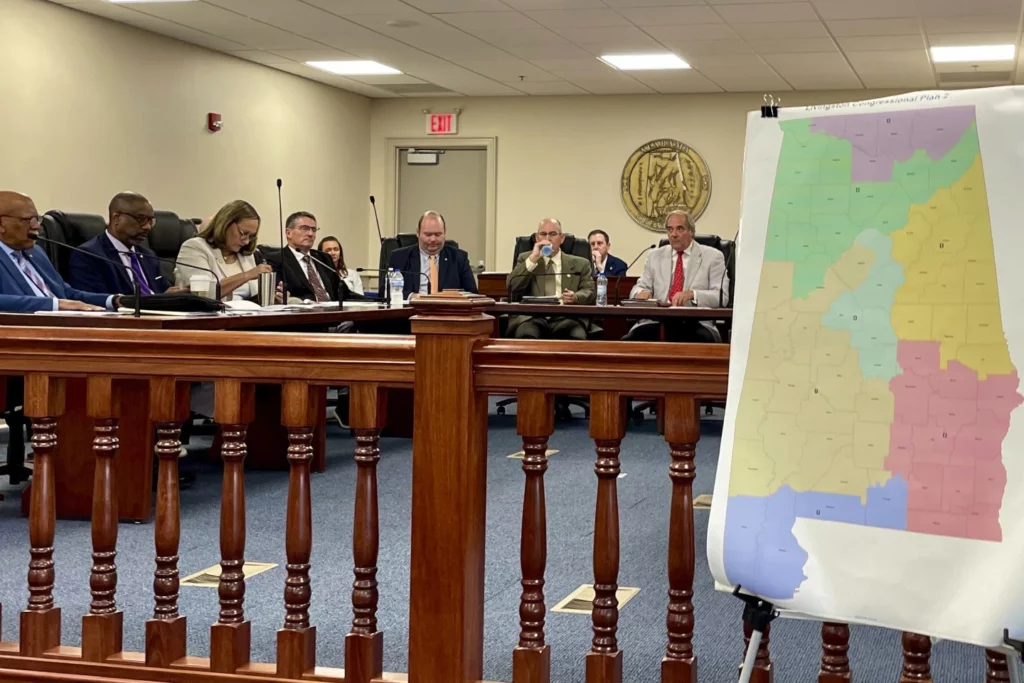
On the eve of a court deadline, Alabama lawmakers are still divided Thursday over the map designating new congressional districts and sparred over what constitutes an “opportunity” district that the state was ordered to create for Black voters. Republican-controlled committees in the House of Representatives and Senate continue to advance separate plans that increase the number of Black voters in the state’s 2nd congressional district but fail to establish the second majority-Black district, as sought by plaintiffs who won the Supreme Court case last month. Under the state Senate plan, the number of Black voters in the 2nd congressional district would increase from about 30% to 38%; under the House plan, it would increase to 42%. “We believe it does meet the Voting Rights (Act) standard because we followed all the guidelines. As an opportunity district, nobody knows what the definition of opportunity is. They didn’t give us (a definition),” Sen. Steve Livingston said. The Republican senator from Scottsboro said the chamber settled on 38% of the population of Black voters as adequate to fulfill the court’s directive. “So I’ve got an opportunity to lose,” said Senate Minority Leader Bobby Singleton, a Democrat from Greensboro. Black lawmakers argued those numbers would make it impossible for a Black candidate to win in that district, and do not comply with the court directive to create a second majority-Black district “or something quite close to it.” “There ain’t no way that in that district — that we’re dealing with here in two — that an African-American got a chance to get elected. Ain’t no way whatsoever,” said Democratic Sen. Rodger Smitherman of Birmingham. State lawmakers face a Friday deadline to adopt new lines after the U.S. Supreme Court in June upheld a three-judge panel’s finding that the current state map — with one majority-Black district out of seven in a state that is 27% Black — likely violates the federal Voting Rights Act. State Republicans, who have been reluctant to create a Democratic-leaning district, are engaging in a high-stakes wager that the panel will accept their proposal, arguing that the compact scale of the districts satisfies redistricting principles, or that the state will prevail in a second round of appeals. The panel that issued a preliminary injunction blocking use of the existing map said in 2022 that Alabama should have “either an additional majority-Black congressional district or an additional district in which Black voters otherwise have an opportunity to elect a representative of their choice.” The judges added that any map should include two districts where “Black voters either comprise a voting-age majority or something quite close to it.” The meaning of the terms “quite close” and “opportunity” has dominated much of the legislative debate. “We’ve got information that’s come from the court. We’ve had information come from the justices, but much of this is speculative as to what they meant,” Senate President Pro Tem Greg Reed, the Republican leader of the Senate, told reporters Thursday. Reed said lawmakers are working toward a compromise between the state House and Senate plans, and that the lawmakers will “absolutely” meet the Friday deadline. Once a new GOP map is approved, the fight will shift quickly back to the courts. A Democratic state senator speculated that Alabama Republicans are seeking another Voting Rights Act challenge before the U.S. Supreme Court. “I think the (Alabama) attorney general is setting up a war with Section 2 (of the Voting Rights Act) so once they get back, they can have a real shot at gutting Section 2. That’s just my gut,” Singleton said. Plaintiffs who won the Supreme Court case have said they will challenge either proposal if enacted. Scott Douglas, executive director of Greater Birmingham Ministries and a plaintiff in the case, said lawmakers have “apparently learned nothing from their loss at the Supreme Court. The Legislature has put forward yet another map that dilutes the electoral power of Black Alabamians.” Republished with the permission of The Associated Press.
Alabama House and Senate both advance GOP congressional redistricting plans
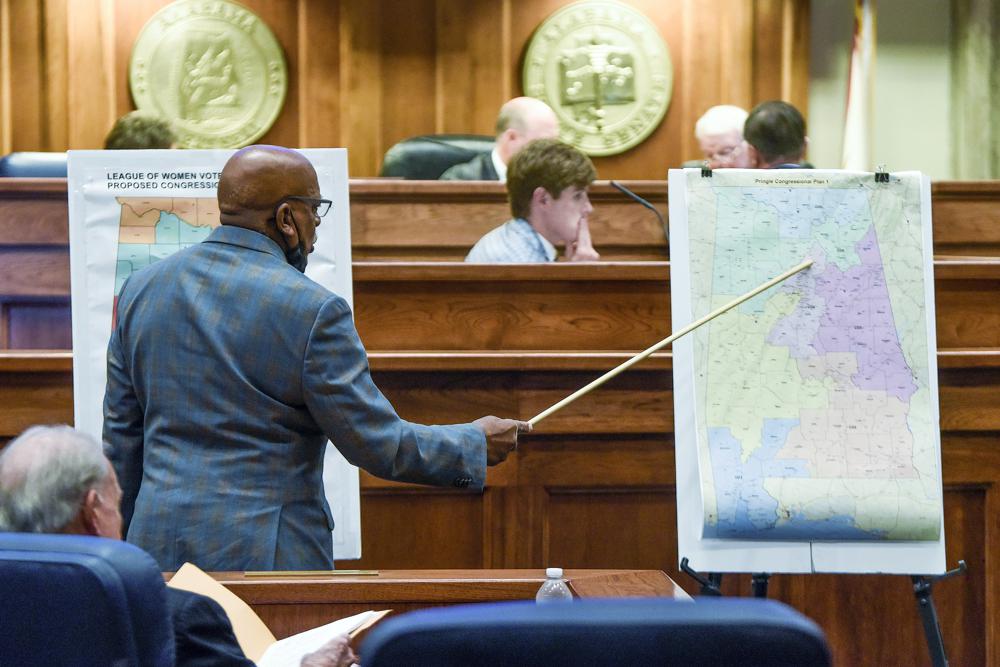
On Wednesday, the Alabama House of Representatives passed a controversial congressional redistricting plan along party lines that failed to create a second majority-minority district. Hours later, the Alabama Senate passed a similar plan that also failed to turn Alabama’s Second Congressional District into a majority-minority district. Civil rights groups are demanding that the Alabama Legislature create a second majority-minority district after the three-judge panel of the Eleventh Circuit Court of Appeals declared Alabama’s 2021 Congressional rezoning in violation of the Voting Rights Act of 1965. After initially staying the decision, the U.S. Supreme Court agreed that the Legislature’s 2021 plan denied Black Alabamians (27% of the population the ability to choose their own congressional representation). The court has ordered the state to present a new redistricting map by July 21. The National Redistricting Foundation (NRF) accused the Legislature of defying the court order by not preparing a plan with two majority-minority districts. The NRF is the 501(c)(3) affiliate of the National Democratic Redistricting Committee (NDRC), Marina Jenkins is the Executive Director of the NRF. “The maps passed by the Alabama House and Senate are in flagrant disregard of the Alabama district court’s order to enact a map with two districts in which Black Alabamians can elect a candidate of their choice, and the Supreme Court’s decision affirming the lower court,” said Executive Director Jenkins in a statement. “This shameful process, riddled with partisan schemes deployed at the expense of Black voters’ rights, has failed the voters of Alabama who deserve a fair and compliant congressional map. Time and time again, Republican legislators have shown their intentions lie solely in maintaining their own political power and silencing the constituents they are meant to represent. Neither the House nor Senate map meet the requirement of the court’s order, or the law, and will be challenged.” The plaintiffs in Milligan v. Allen that challenged the 2021 redistricting presented two maps to the court showing either two 51% Black districts or two districts that were 48% Black. The NRF has endorsed a heavily gerrymandered (along racial lines) plan that results in a 52.2% Black Second Congressional District and a 56.7% Black Seventh Congressional District. The NRF-supported plan achieved that by dividing Mobile County into a majority-Black section that would be in the new majority-minority district that would stretch from the Mississippi to Georgia state lines and an overwhelmingly White portion that would then be in the First Congressional District with nearby Baldwin County (which is overwhelmingly White and Republican). It similarly divides Jefferson and Tuscaloosa Counties along racial lines. The Seventh Congressional District is already a majority-minority district represented since 2011 by Rep. Terri Sewell – a Black Democrat. That plan also puts Congressman Jerry Carl (R-AL01) and Congressman Barry Moore (R-AL02) into the same district – the First. The Republicans in the Alabama Legislature have rejected any plan that divides Mobile County or splits Baldwin and Mobile into separate congressional districts. They argue that the Alabama Gulf Coast and the Wiregrass regions should not be divided. The Republican Legislators call their plan the Communities of Interest Plan. The House passed a version of that plan that keeps Mobile and Baldwin whole and in the First Congressional District but increases the number of Black voters in the Second Congressional District to 42.5%. The Seventh Congressional District would be 52.15% Black. The Legislative Committee on Reapportionment is chaired by State Rep. Chris Pringle – a Mobile Republican – and State Sen. Steve Livingston – a North Alabama Republican. Pringle sponsored the plan that the House of Representatives passed, while Livingston sponsored the plan that the Senate passed. Pringle insisted that even though there are more Whites than Blacks in his plan’s Second Congressional District, it would be a toss-up district that either party could win. Black legislators insisted that the only way a Black person could win a congressional race in Alabama is if the district is majority Black. In the Senate plan, the Second Congressional District would become 38.8% Black, and the Seventh Congressional District would remain majority Black. If either of the Republican plans passes the Legislature on Friday as drawn today, the plaintiffs are almost certain to reject that plan and ask the three-judge panel in Atlanta to reject the Alabama GOP plan and appoint a special master to draw the districts. To connect with the author of this story or to comment, email brandonmreporter@gmail.com.
Public meetings on congressional redistricting announced

On Wednesday, State Sen. Steve Livingston (R-Scottsboro) and State Rep. Chris Pringle (R-Mobile), who serve as the joint chairs of the Permanent Legislative Committee on Reapportionment, announced a series of meetings and deadlines on the looming congressional redistricting. The first meeting will be on June 27 at 1:30 P.M. in the Alabama State House Room 200. This will be a meeting of the Joint Committee and a public hearing. People unable to attend can watch the proceedings online at the Legislature’s website. July 7 at 5:00 P.M. is the deadline for all plans to be submitted to the Reapportionment Committee. You can contact the committee directly by email at: district@alsenate.gov. The committee will meet again and hold a public hearing on July 13 at 1:30 P.M. in State House Room 200. On August 14, there will be a hearing at Hugo L. Black United States Courthouse in Birmingham. The House members serving on the Permanent Legislative Committee on Reapportionment members include Cynthia Almond (R-Tuscaloosa); Barbara Boyd (D-Anniston); Jim Carns (R-Birmingham); Steve Clouse (R-Ozark); Corley Ellis (R-Columbiana); Chris England (D-Tuscaloosa; Laura Hall (D-Huntsville); Sam Jones (D-Mobile); Joe Lovvorn (R-Auburn); and Rex Reynolds (R-Huntsville). In 2022 a three-judge panel of the Eleventh Circuit Court of Appeals rejected Alabama’s 2021 congressional redistricting as being in violation of the Voting Rights Act of 1965—the U.S. Supreme Court, which earlier this month agreed. The three-judge panel has given the Legislature until the middle of next month to submit a new congressional redistricting plan to the federal court. The three-judge panel has ordered the Legislature to submit a new map with two majority-minority districts or something as close to that as possible. Alabama Governor Kay Ivey is expected to call a special session no later than July 17 to attempt to comply with the court order. If the Legislature cannot reach an agreement on a redistricting plan by July 21, or the Court does not like the State’s plan, then the three-judge panel may appoint a special master to draw the districts for the State. Republicans currently control six of Alabama’s congressional seats, while Democrats control only the Seventh Congressional District. None of the seven congressional races were competitive during last year’s general election. The redistricting could make two of those districts winnable for Alabama Democrats. It could also cost Democrats a seat if they make it too competitive. To connect with the author of this story or to comment, email brandonmreporter@gmail.com.

